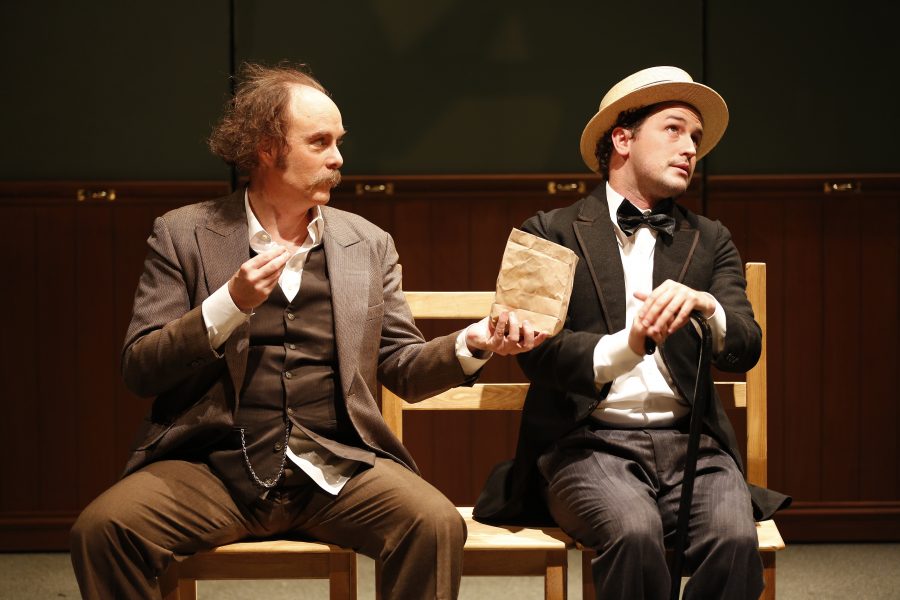
 Relativity describes the dependence on the perspective from which the viewer considers things. Jay Prasad’s "Einstein", now playing at the beautiful Theatre at St. Clement’s, makes full use of the scientist’s famous concept by inviting us to consider his biography from a different viewpoint. Apart from his renowned theory, "Einstein" peers into his private life, his relationships with his family as well as with other scientists, and into his beliefs. “Morality is relative,” Einstein states meaningfully, with a glance at the audience, providing a neat aphorism for handling the rarely-seen complexity that gets laid bare in this biographical work.
Relativity describes the dependence on the perspective from which the viewer considers things. Jay Prasad’s "Einstein", now playing at the beautiful Theatre at St. Clement’s, makes full use of the scientist’s famous concept by inviting us to consider his biography from a different viewpoint. Apart from his renowned theory, "Einstein" peers into his private life, his relationships with his family as well as with other scientists, and into his beliefs. “Morality is relative,” Einstein states meaningfully, with a glance at the audience, providing a neat aphorism for handling the rarely-seen complexity that gets laid bare in this biographical work.
While "Einstein" doesn’t delve too deeply into physics jargon, it’s worth doing a basic refresher before going to see the show. The totally science-averse will be bored and those with a mastery of the material will likewise be impatient with the superficial treatment of the ideas at hand. "Einstein" is ambitious in scope, contending with a lot of broad, far-reaching topics, though it doesn't penetrate deep enough into the questions it raises. It might want to be more, but it is ultimately a biographical account–a long, dry one.
While long exchanges debating the merit of scientific theories may lose some of the audience, there is a lot to consider aside from the theories. A multifaceted personality emerges of a figure who we now mostly encounter in dependable clichés. His name most often appears in sarcastic jabs (“Great going, Einstein,”) and in the type of quotations that can be found on Pinterest pins. Now Einstein is getting the same treatment that most public figures can’t escape today—an exploration by the media not just of their pertinent work, but extensive speculation of their private lives. This story, however, is not worth exhuming.
The revealing glimpse that "Einstein" offers is not a sympathetic one. While he seems sage and dignified in internet adages, this Einstein is agitated, nervous, and arrogant. He is painfully awkward and uncaring in his personal relationships. He is torn by qualms as he does his scientific work in the age of modern warfare. He is simultaneously self-important and self-loathing, like a grad student. Richard Kent Green strikes a compelling combination of these qualities as the titular scientist in some scenes, as he remains defiant in the face of a professor who throws his paper into the wastebasket, though he is comically and implausibly skittish for most of his stage time.
World events and personal relationships—children, two wives, friends—are inconvenient intrusions into Einstein’s secluded mental work. "Einstein" puts the character into his historical context of World Wars, Hitler, and nationalism and addresses the moral dilemma accompanying the invention of new technology with unforeseen consequences, good or evil.
Einstein’s goals are lofty but his actions are often petty. “I could never love an individual, but I love mankind,” he says, addressing the confusing principles on display. He advocates progressive ideas like pacifism while neglecting his children, and the characters around him become overwrought with emotion as he stays aloof. Jill Durso is notable as his frustrated but loyal first wife, expressing the fury to compensate for the scientist’s detachment. Grant Kretchik also commands attention as Neils Bohr, representing the scientific community that revered Einstein but was forced to grapple with his reluctance to accept breakthroughs in quantum physics and the Big Bang Theory.
"Einstein" is pretty straightforward in its story. It introduces some philosophies and theories, but doesn’t delve too deeply into any. It covers a lot, and some major issues receive perfunctory treatment. Hitler makes a weird appearance, references to Zionism and socialism are made, but the analysis is mostly left up to the audience. At its climax, the play skims the surface of the magnitude of the atomic bombings, an event which arguably never would have happened without Einstein’s innovations. The examination of this watershed in the history of physics just begins to ask, “progress, but at what cost?” as Einstein confronts the devastating consequences of his discoveries. This meek question, as it emerges, gives the play its strength. While it might be best to leave Einstein's personal life to history, sans the celebrity treatment, this question is poignant and relevant as ever today.